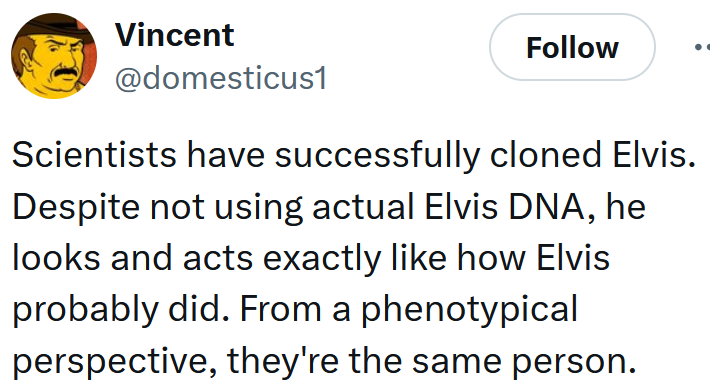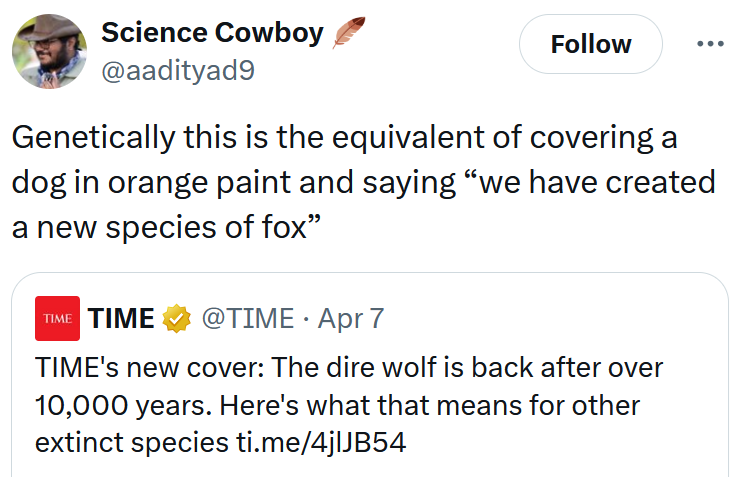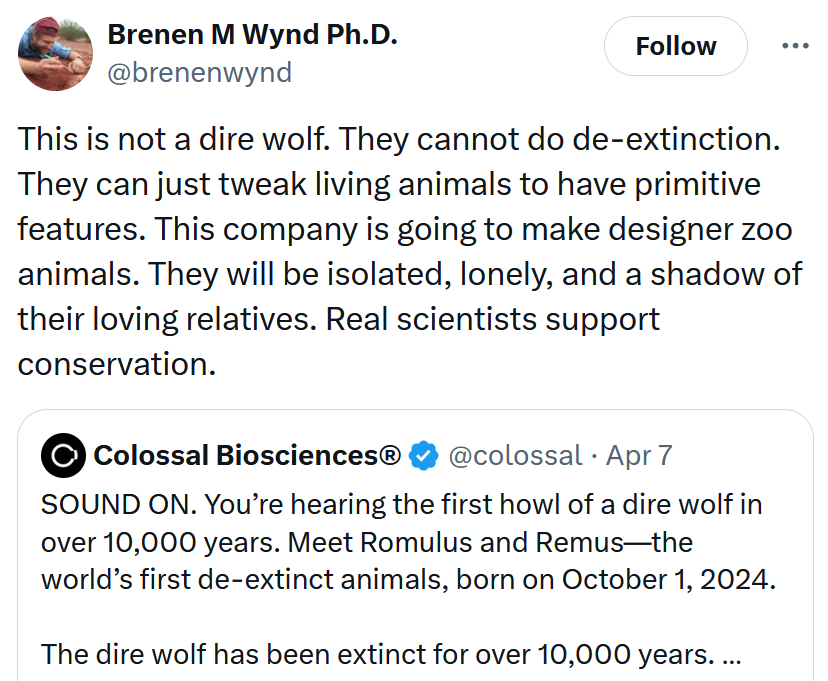An announcement from biotech company Colossal Biosciences claimed to have brought back the dire wolf, a species that died out around 12,500 years ago. However, excitement around the reports quickly turned to skepticism. While the Dallas-based company did successfully edit the genes of three gray wolf pups to give them traits similar to dire wolves, some experts were quick to argue the animals are still in every meaningful way, regular wolves.
Headlines declaring that the extinct dire wolf came back to life, including a TIME cover, were a magnet for this backlash. Scientists and skeptics criticized the company’s framing, claiming dire wolves weren’t technically wolves to begin with, and that while the company claims to have created the “world’s first successfully de-extincted animal,” the possibility of de-extinction remains disputed.
SOUND ON. You’re hearing the first howl of a dire wolf in over 10,000 years. Meet Romulus and Remus—the world’s first de-extinct animals, born on October 1, 2024.
— Colossal Biosciences® (@colossal) April 7, 2025
The dire wolf has been extinct for over 10,000 years. These two wolves were brought back from extinction using… pic.twitter.com/wY4rdOVFRH
Did they really bring the dire wolf back?
According to the New York Times, Colossal Biosciences edited 20 genes within each of the three gray wolf embryos to give them “key features” of dire wolves. This includes the thick white coat that each puppy was born with. They’re also quite large overall, with especially big heads.
The company claims to have achieved this by extracting DNA from dire wolf fossils in 2021, isolating and growing gray wolf cells, and “tinkering” with the genes. They then transferred that DNA into empty canine eggs and transplanted those into fertile dogs. Most didn’t take, but three white puppies—Romulus, Remus, and Khaleesi—named for the dire wolves in the Game of Thrones book and TV series—were born six and two months ago.
Chief Science Officer Dr. Beth Shapiro told NewScientist the distinction between regular wolves and dire wolves comes down to the definition of “species.”
“You can use the phylogenetic [evolutionary relationships] species concept to determine what you’re going to call a species, which is what you are implying,” she said. “We are using the morphological species concept and saying, if they look like this animal, then they are the animal.”
In a statement emailed to the Daily Dot, Colossal Biosciences dismissed the criticism over their claims—particularly over what “species” means—calling the details “a distraction from the real achievement.”
“This is the most significant advancement in gene-editing in history. Even our harshest critics admit it,” the statement says.
“Why is the scientific community wasting time bickering about species concepts rather than celebrating this monumental achievement and its implications? It’s obvious most critics would rather complain than contribute. Through our dire wolf and woolly mouse announcements, Colossal has generated more attention and funding for conservation than anyone has in decades.”
What is the difference between a dire wolf and a regular wolf?
In early 2021, new data from the study of dire wolf DNA suggested dire wolves and gray wolves are not closely related. In fact, according to Scientific American, the phrase “dire wolf” is a bit of a misnomer. They’re actually “the last of a dog lineage that evolved in North America.”
These large beasts certainly resembled wolves but had larger skulls, jaws, and teeth designed to hunt megafauna. They evolved long before the gray wolf came over from Europe and only had a common ancestor around 5.7 million years ago.
Social media reacts
Plenty of X users mocked the TIME cover declaring Remus a dire wolf and displaying the word “Extinct” with a big red line through it. User @domesticus1 compared the claims by Colossal Biosciences to calling an Elvis impersonator the real thing.

“Scientists have successfully cloned Elvis,” they joked. “Despite not using actual Elvis DNA, he looks and acts exactly like how Elvis probably did. From a phenotypical perspective, they’re the same person.”
Another user who goes by “Science Cowboy” and claims to be a wildlife biologist quipped, “This is the equivalent of covering a dog in orange paint and saying ‘we have created a new species of fox.’”

Skeptics abounded on Bluesky as well, often chastising news media for sensationalizing dubious claims by a private company. User @nameshiv.bsky.social warned that “the wolves are normal, the state of journalism is dire.”

What scientists have to say about the dire wolves: conservation, not creation, is the priority
Speaking to BBC, Paleogeneticist Dr. Nic Rawlence of Otago University said DNA extracted from fossils is too old and damaged to clone. All you can do with it is reconstruct and observe the sequences, then maybe try to imitate some of these in another animal.
“Ancient DNA is like if you put fresh DNA in a 500-degree oven overnight,” he said. “It comes out fragmented—like shards and dust.”
“You can reconstruct [it], but it’s not good enough to do anything else with.”
On X, Dr. Brenen M. Wynd of Southeastern Louisiana University wrote that “de-extinction” remains impossible. He also worried for these wolves and future altered animals, calling for conservation over DNA experimentation.

“This is not a dire wolf. They cannot do de-extinction,” he said on X. “They can just tweak living animals to have primitive features. This company is going to make designer zoo animals. They will be isolated, lonely, and a shadow of their loving relatives. Real scientists support conservation.”
The Daily Dot has reached out to Colossal Biosciences for comment via email.
The internet is chaotic—but we’ll break it down for you in one daily email. Sign up for the Daily Dot’s web_crawlr newsletter here to get the best (and worst) of the internet straight into your inbox.


